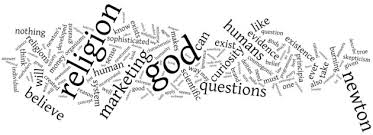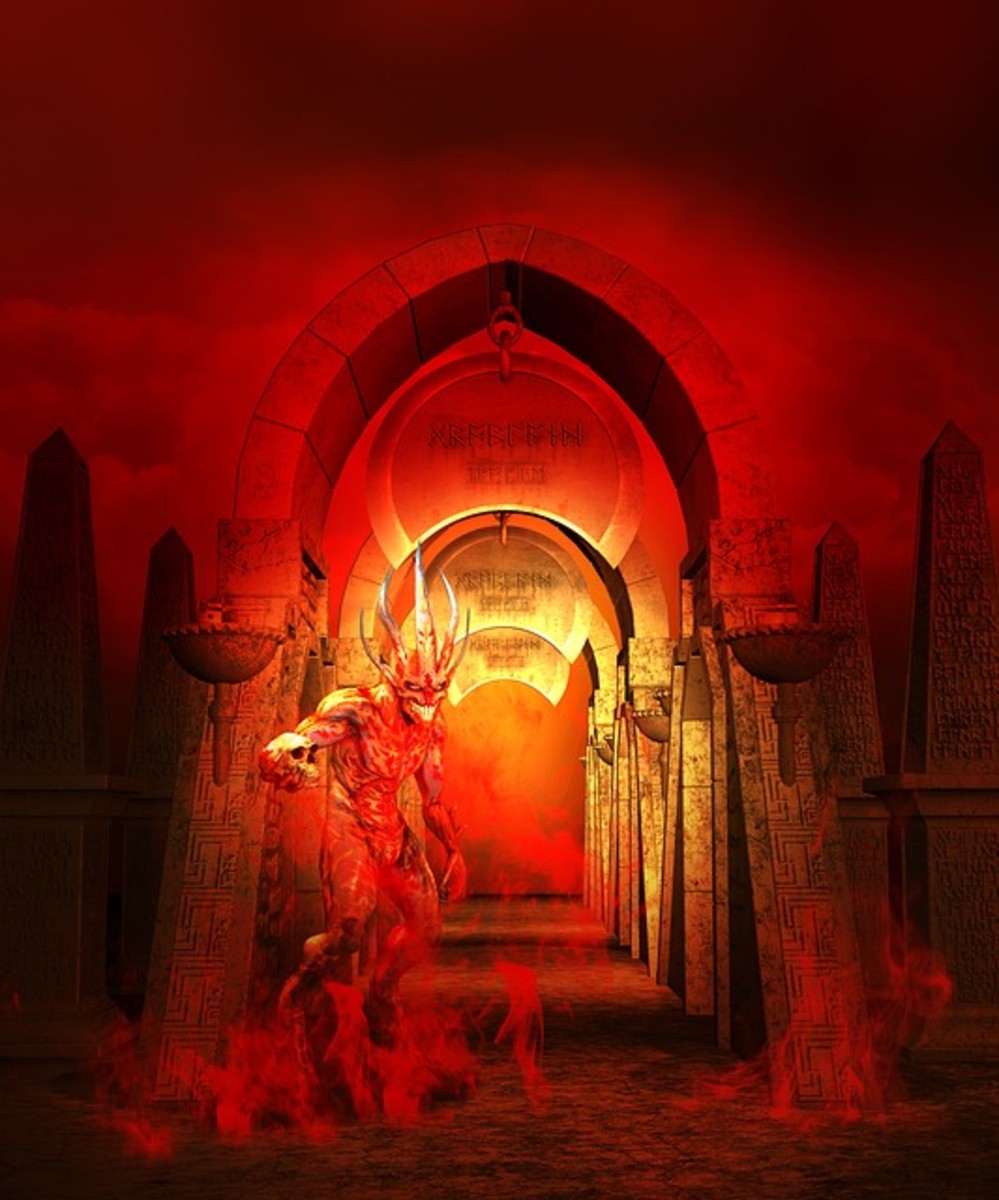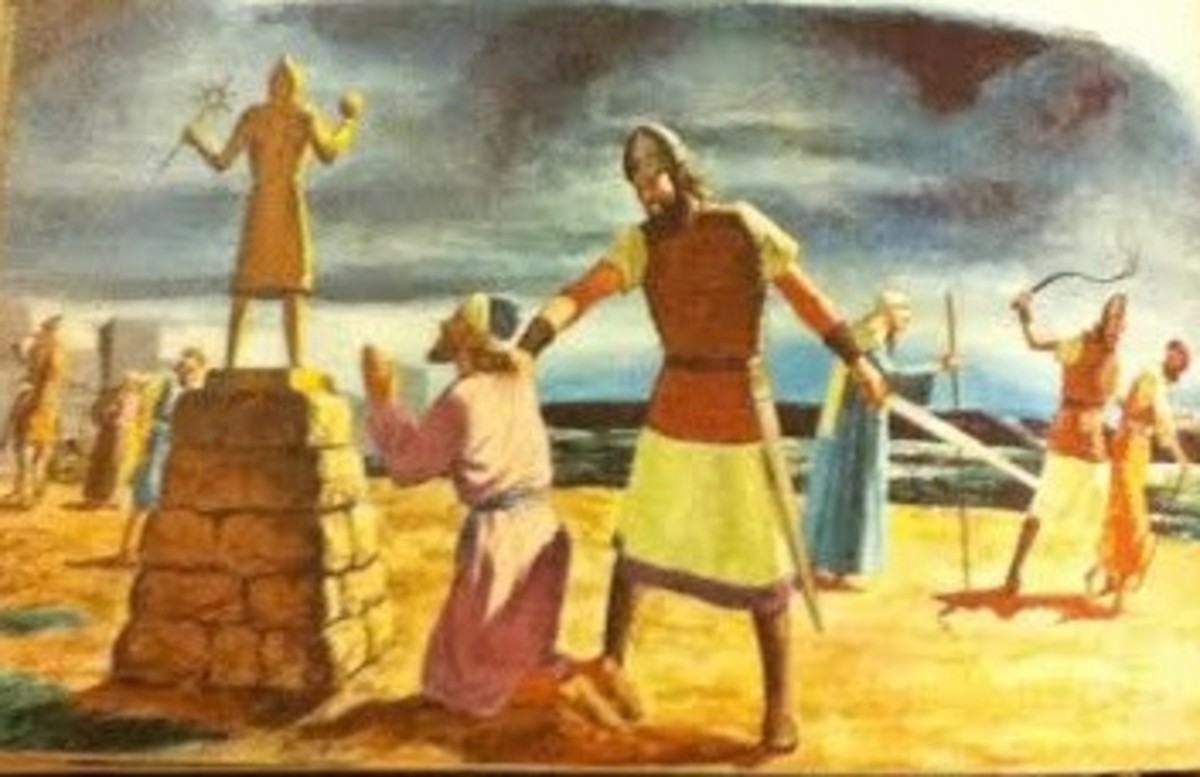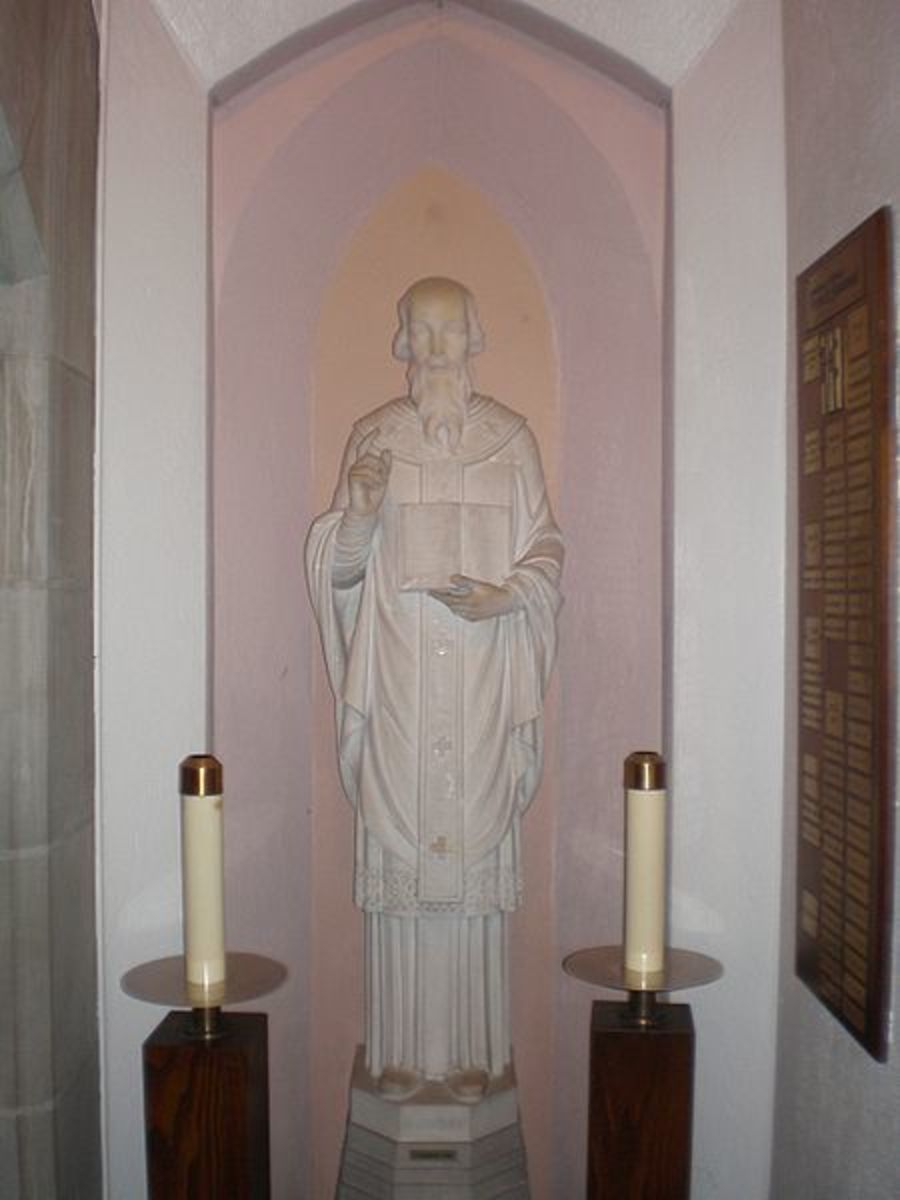The God Question: (A Meditation)

Good Day Random Readers from HubPages and elsewhere in cyberspace!
First of all, let me say that I would NEVER engage this topic in the discussion forums here on HubPages. As I have said time and time again (and will continue to say time and again), the political/economic/social issues and religious/philosophical topic forums are almost invariably mean-spirited, razor-thin in terms of narrowness of perspective, and both ill-informed and uninformed. Now, I am not saying that I am some kind of exemplar of erudition, but the participants in these forums seem to show no interest in increasing their knowledge-base about the things they hold forth on.
R.I.F. Remember that advertising campaign from the 1970s and early '80s? Reading is Fundamental --- R.I.F.
The principal discourse (if one can call it that) on the HubPages discussion forums concerning what some people call 'religion,' are shootouts between self-professed atheists and theists.
Why do I say 'self-professed' atheists?
I am indebted to the analysis of the literary theorist and critic, Terry Eagleton, for this notion.
http://en.wikipedia.org/wiki/Terry_Eagleton
In a YouTube clip I heard Professor Eagleton make the argument that goes something like this: Over the course of intellectual history, in various disciplines, some thinkers set themselves decisively against the grain, against the dominant, prevailing conceptual and theoretical understandings. These people, 'rebels,' if you like, were thus given the tag anti- this, that, or the other thing.
The crucial point to understand about these intellectual and scholarly rebels is this: They only went down the road of anti- this, that, or the other thing AFTER they had fully comprehended the VERY BEST representation of the point of view they wanted to oppose.
For example, in the sphere of economics Karl Marx was clearly an intellectual rebel, if you will. He became a published anti- representative against classical economics after he had thoroughly studied the works of the most prominent economists (political-economists as they were known in the 19th century), learning what he could from them, and writing very long summaries and analyses of their ideas. The only other political-economist, that we know of, to show such rigor, was Schumpeter (1).
What Eagleton was saying, therefore, is this: If you want to be an anti-religionist, anti-theology thinker, be against the concept of a God or any other gods, fine. But in going down that path, for the sake of intellectual integrity, you should understand what the very best of the tradition you wish to oppose has to say about the existence of God --- the very best of theology!
That is manifestly NOT what is occurring, says Eagleton. Instead, by and large, the ideas being circulated under the rubric of 'atheism,' are in opposition to rather subpar, cheap, lackadaisical, unsophisticated, fourth-rate so-called theology --- not the very best of what theology has had to say about the existence of God; hold on, its not as simple as you think. :D
The independent religious scholar Karen Armstrong joins Eagleton in precisely this critique of atheism today ('New Atheism'). Both Armstrong and Eagleton singled out Richard Dawkins and the late Christopher Hitchens, as two of the more prominent spokespeople for new atheism. Just so we're clear: Armstrong and Eagleton are saying that the ideas of Dawkins and Hitchens DO NOT OPPOSE THE BEST OF WHAT THEOLOGY HAS TO SAY ABOUT THE EXISTENCE OF GOD (2).
At this point Dr. Eagleton says --- teasingly but sincerely --- that one really hesitates to call the anti- people atheists, per se, since they simply do not have any grasp of what they believe they are opposing.
What does the best of theology have to say about the existence of God?
We are indebted to the scholarship of Karen Armstrong for unearthing this for us. Let us read from her book The Case For God (2009):
"Many people in the premodern world went out of their way to show that it was very difficult indeed to speak about God.....
"... some of the greatest Jewish, Christian, and Muslim theologians made it clear that while it was important to put our ideas about the divine into words, these doctrines were man-made, and therefore bound to be inadequate. They devised spiritual exercises that deliberately subverted normal patterns of thought and speech to help the faithful understand that the words we use to describe mundane things were simply not suitable for God. 'He' was not good, divine, powerful, or intelligent in any way that we could understand. We could not even say that God 'existed,' because our concept of existence was too limited. Some of the sages preferred to say that God was 'Nothing' because God was not another being. You certainly could not read your scriptures literally, as if they referred to divine facts. To these theologians some of our modern ideas about God would have seemed idolatrous.
Continuing on..... "It was not just a few radical theologians who took this line. Symbolism came more naturally to people in the premodern world than it does to us today. In medieval Europe, for example, Christians were taught to see the Mass as a symbolic reenactment of Jesus's life, death, and resurrection. The fact that they could not follow the Latin added to its mystique. Much of the Mass was recited by the priest in an undertone, and the solemn silence and liturgical drama, with its music and stylized gestures, put the congregation into a mental 'space' that was separate from ordinary life. Today many are able to own a copy of the Bible or the Qur' an and have the literacy to read them, but in the past most people had an entirely different relationship with their scriptures. They listened to them, recited piecemeal, often in a foreign language and always in a heightened liturgical context. Preachers instructed them not to understand these texts in a purely literal way and suggested figurative interpretations. In the 'mystery plays' performed annually on the feast of Corpus Christi, medievals felt free to change the biblical stories, add new characters, and transpose them into a modern setting. These stories were not historical in our sense, because they were MORE than history" (3).
A few points to emphasize here before we go on
1. This is, yet AGAIN, why the study of history is so important. By examining the history we can get an idea about what the social and cultural CONTEXT is of the traditions handed down to us down through the centuries. I hope your getting a glimmering now, but by the time you finished reading this hub you will understand that the average Jewish person, Christian, or Muslim in the premodern world practiced their religion in a very, very, very different way than we do today. Indeed, as Karen Armstrong mentioned, many of our so-called ideas about the divine would probably have struck medievals as idolatrous.
2. Even the high priests of these religions in the premodern world, said, due to our limited concept of existence, human beings were, therefore, not even qualified to say that God 'existed.'
3. As a rule, in the premodern world, people did not take their scriptures literally. This means that fundamentalism was impossible and nonexistent in a previous age. We'll go deeper into this point as we go on.
Question: If the claim is being made that the high theologians of Islam, Judaism, and Christianity expressed ambiguity about the very existence of God, what is the point of organized religion and why did 'they' create elaborate, rigid systems we have today?
First of all, 'they' did not create these elaborate, rigid systems we have today. The crystallization of extreme theological formality happened over time. The Protestant Reformation, as we shall see, had a lot to do with it.
Question: Yes, but given the fact that in the premodern world the very question of the existence of God was a matter of ambiguity, what was there ever really to talk about in detail? How did 'rumors,' if you like, lead to the development of systematized religion in any case?
Human beings, almost from the very beginning of our sentience, as far as we know, have had the suspicion that God existed even though we cannot apprehend 'him' with our senses. The principal way this has been confirmed for us is by the reports of spiritual travelers, who, through the use of meditative practice of varying degrees of sophistication, altered their state of consciousness, moving to a degree of interiority that completely blocks out the external world for the traveller, who then experiences a kind of soul-to-soul personal contact with the divine. This experience has always left the traveller profoundly changed in several dimensions of his personality (4).
------------------------------------------------------------------------------------------------------------
Let's read a little bit from the book The Secret of Yoga (1972). The author Gopi Krishna wrote in Chapter 2: "The mystical state is still an incomprehensible phenomenon of consciousness. The range of its expression is so varied and the area of its manifestations so extensive that it is difficult at this stage of our knowledge to assign any well-marked limits to it. In its most common form the time of its occurrence and the duration of its operation are unpredictable. The flash is inner illumination may last only for a few moments, like the bedazzling brightness of a meteor shooting across the sky in the darkness of night, or it may continue for an hour or several hours or even days at a time. It may occur once in a lifetime, or a few times in one's life, or daily, or every night at different hours. Sri Ramakrishna's ecstasies lasted for both short and long durations and, sometimes, entrancement occurred several times in a day. St. Angela of Foligno had her highest vision of God three times, and Plotinus, according to his disciple Porphyry, four times in a period of six years (5).
Continuing... "In the case of a clergyman quoted by William James, 'the soul opened into the infinite ... with ineffable joy and exultation' only once, while in the case of Margiad Evans the state of union was of long duration, extending even to sleep. Shams-i-Tabriz, the mystic poet of Persia, was perennially in a state of divine intoxication: 'In a place even beyond outer space, in a tract without a trace of shadow, soul and body transcending, I live in the soul of my Loved One anew,' he says" (6).
Basically, this is how the Prophet Muhammad revealed the Qur'an and the religion of Islam in seventh-century Arabia (7).
Am I making the claim that accounts of supposed 'eyewitnesses,' these spiritual travellers, constitute some kind of proof of the existence of a Deity or Deities? Am I being partisan in the atheist/theist debate after all?
No, and neither was Gopi Krishna. Gopi Krishna was NOT making reference to the voluminous accounts of the genuine experiences of the spiritual travellers, throughout the centuries, as proof that they had made contact with the Deity or Deities.
Question: Hold on, wait a minute! How can you, on the one hand, say that the experiences of the 'spiritual travellers' were genuine (as far as we know), while simultaneously denying (because that's what we're doing) that they had made some kind of contact with the Deity or Deities?
Let read a little more from The Secret of Yoga.
First of all, contrary to our notions of what we call 'Yoga' in the Western world, this is not a mere something for the health club.
Gopi Krishna wrote: "The aim of Yoga is to accelerate a natural process, already at work in the human organism: to mold the brain to a higher state of awareness. Modern psychology has no inkling of this process and, therefore, does not take it seriously into account in its treatment of the mind and its problems. There is no recognition among present-day psychologists of the obvious fact that the human brain is still evolving toward a yet unknown destination. This being the case, psychology can as yet have no jurisdiction over the province covered by Yoga. It is for this reason that, in spite of its antiquity and the overwhelming testimony of hundreds of top-rank intellectuals of India, the validity of Yoga as a means to gain transcendent states of consciousness still remains to be accepted by scholars of today, and the whole subject is obscure and controversial" (8).
Now then, the purpose of Yoga (this is both a specific and general umbrella term for meditative practices) is NOTHING LESS than to speed up the evolutionary process at work in the human organism. This being the case, Gopi Krishna made the argument that no mystic has ever made soul-to-soul contact with the Deity. Instead what has happened, argued Gopi Krishna, was that every successful seeker has experienced brief, momentary jumps in their evolutionary potential. Basically what happened was that the seeker's ability to perceive reality in multidimensional terms, so to speak, became sharply enhanced for a time (9).
However, this enhancement of the seeker's ability to perceive struck him as so awesome, so dramatic, and so overwhelming and so miraculous that he mistook it for personal, soul-to-soul contact with The Deity. It could not be otherwise for Gopi Krishna. He convincingly argued that the very fact that the accounts of the seekers throughout the centuries were so varied, not one of them could have possibly discovered The Truth (10).
Indeed, Gopi Krishna considered it a kind of arrogance to assume that there's human beings and "next stop," as it were, The Lord. Gopi Krishna argued: Why shouldn't there be numerous other races of beings in the universe, each operating at different stages of consciousness, who separate us from soul-to-soul communion with the Deity (11)?
---------------------------------------------------------------------------------------------------------------
Question: You still seem to making a partisan claim that there IS a God to be discovered, just that we human beings are not yet advanced enough to find 'Him.'
Answer: Again, we have to refer to the historical tradition from which the religions of the world have been handed down to us. Karen Armstrong, in her book, The Case for God, makes it clear that in the premodern world, the concepts of fundamentalism and atheism, as we understand the terms, did not exist. Indeed, the average person neither believed nor disbelieved in God! That was not the point of religion, as we shall see.
Let's go back to reading from The Case For God.
In the introduction Armstrong wrote: "In most premodern cultures, there were two recognized ways of thinking, speaking, and acquiring knowledge. The Greeks called them mythos and logos. Both were essential and neither was considered superior to the other; they were not in conflict but complementary. Each had its own sphere of competence, and it was considered unwise to mix the two. Logos ("reason") was the pragmatic mode of thought that enabled people to function effectively in the world. It had, therefore, to correspond accurately to external reality. People have always needed logos to make an efficient weapon, organize their societies, or plan an expedition. Logos was forward-looking, continually on the lookout for new ways of controlling the environment, improving old insights, or inventing something fresh. Logos was essential to the survival of our species. But it had its limitations: it could not assuage human grief or find ultimate meaning in life's struggles. For that people turned to mythos or 'myth'" (12).
Continuing.... ".. in the past, myth was not self-indulgent fantasy; rather, like logos, it helped people live effectively in our confusing world, though in a different way. Myths may have told stories about the gods, but they were really focused on the more elusive, puzzling, and tragic aspects of the human predicament that lay outside the remit of logos. Myth has been called a primitive form of psychology. When a myth described heroes threading their way through labyrinths, descending into the underworld, or fighting monsters, these were not understood as primarily factual stories. They were designed to help people negotiate the obscure regions of the psyche, which are difficult to access but which profoundly influence our thought and behavior. People had to enter the warren of their own minds and fight their personal demons. When Freud and Jung began to chart their scientific search for the soul, they instinctively turned to these ancient myths. A myth was never intended as an accurate account of a historical event; it was something that had in some sense happened once but that also happens all the time" (13).
Mythos and Logos. Premodern people considered it unwise to mix the two. Why? One of two things can (and did) result from this: 1) You can get fundamentalism, because now, you are in a position to have to defend the literal truth of events that were only meant to be metaphorical; and 2) You can also atheism (as we understand the term today), because you are now put in the equally unreasonable position of using logos to dismiss the value of mythos completely and out of hand. As we will see, this is precisely what happened with the result of the Enlightenment and the Protestant Reformation.
The Garden of Eden and Original Sin
Karen Armstrong wrote:
"Yahweh forbids Adam and Eve to eat the fruit of the Tree of Knowledge, the snake persuades them to disobey, and they are cast out of the garden forever. Henceforth they must toil painfully to scratch a living from the hostile earth and bring forth their children in sorrow. Like any myth, its purpose is to help us to contemplate the human predicament. Why is human life filled with suffering, back-breaking agricultural labor, agonizing childbirth, and death? Why do men and women feel so estranged from the divine?
"Some Western Christians read the story as a factual account of the Original Sin that condemned the human race to everlasting perdition. But this is a peculiarly Western Christian interpretation and was introduced controversially by Saint Augustine of Hippo only in the early fifth century. The Eden story has never been understood in this way in either the Jewish or the Orthodox Christian traditions. However, we all tend to see these ancient tales through the filter of subsequent history and project current beliefs onto texts that originally meant something quite different. ... In fact, ..., until well into the modern period, Jews and Christians both insisted that it was neither possible nor desirable to read the Bible in this way, that it gives no single, orthodox message and demands constant reinterpretation" (14).
Okay? So, scripture belongs to the very nonlinear, non-specific realm of mythos. So, that's the story of the Garden of Eden and Original Sin. Scripture was always understood to belong to the nonlinear, non-specific, imaginative realm of mythos. And while we're at it, you should understand, therefore, that FIRST-RATE THEOLOGY has NEVER placed itself in opposition to or in competition with science. FIRST-RATE THEOLOGY has NEVER claimed that God literally created the universe including the Earth in six days, resting on the seventh.
Indeed, St. Augustine himself said that where scripture comes into conflict with science, another interpretation of scripture had to be found (15)
After the Dark Ages in Western Europe at the end of the eleventh century, Christianity started to become more intellectualized and rationalized under the influence of its contact with the more advanced spheres of the Islamic world and Greek Byzantium (16).
Chapter six of Karen Armstrong's book, The Case For God, is titled: Faith and Reason. She would have us understand that this period, the end of the eleventh century, was the start of a project embarked upon by philosophers and theologians to construct conceptual 'proofs' for the existence of God. Armstrong made it clear that this activity was stil devotional in nature, not skeptical or objective, if one wants to use such terms. Intellect, reason, and the scientific method were put in the service of faith, not in competition of refutation of faith. At this time society had not yet mixed mythos and logos.
Devotion to God did not depend on 'proving' God's existence. The goal was to pass from 'faith to understanding,' NOT from 'understanding to faith' (17).
-------------------------------------------------------------------------------------------------------------
One small point about the concept of 'atheism'
In The Case For God, Karen Armstrong wrote:
"Historically, atheism has rarely been a blanket denial of the sacred per se but has nearly always rejected a particular conception of the divine. At an early stage of their history, Chrisitans and Muslims were both called 'atheists' by their pagan contemporaries, not because they denied the reality of God but because their conception of divinity was so different that it seemed blasphemous. Atheism is therefore parasitically dependent on the form of theism it seeks to eliminate and becomes its reverse mirror image. Classical Western atheism was developed during the nineteenth and early twentieth centuries by Feuerbach, Marx, Nietzsche, and Freud, whose ideology was essentially a response to and dictated by the theological perception of God that had developed in Europe and the United States during the modern period. The more recent atheism of Richard Dawkins, Christopher Hitchens, and Sam Harris is rather different, because it has focused exclusively on the God developed by the fundamentalisms, and all three insist that fundamentalism constitutes the essence and core of all religions. This has weakened their critique, because fundamentalism is in fact a DEFIANTLY UNORTHODOX form of faith that frequently misrepresents the tradition it is trying to defend. But the 'new atheists' command a wide readership, not only in secular Europe but even in the more conventionally religious United States. The popularity of their books suggests that many people are bewildered and even angered by the God concept they have inherited" (18).
Pretty straightforward and self-explanatory, right?
So, there was a time when early Christians and Muslims were called 'atheists' by their pagan contemporaries, because the former's conception of the divine was so alien to the latter. Another thing about the history of ideas worth remembering is, that even within religions, the development of a consensus view about the nature of the Divinity has never been easy and uncontroversial.
To see that, let us travel many centuries back in time, by reading a little bit from a book called Why I Am A Unitarian Universalist (1964) by Jack Mendelsohn. Dr. Mendelsohn gave us a little history lesson about the concept of the Trinity and the role of Jesus in the Christian faith.
He wrote:
"The Christian origins of our movement are anchored in the moral teachings of Jesus, as exemplified in the Beatitudes and the Sermon on the Mount. We realize, however, that there are many complications in making an 'historical' assessment of Jesus. Most of us believe that on the basis of the evidence available to us, Jesus, at most, thought of himself as the Jewish Messiah. It was later followers and interpreters, like the Apostle Paul, who transformed Jesus into a Christian Savior atoning to God for the sins of mankind.
Continuing... "In a technical sense, early Christianity was neither Trinitarian nor Unitarian. For nearly three centuries after Jesus' death no specific doctrine of this type was enforced as part of an official Christian creed. When doctrinal controversies became overly stormy and violent, the Roman emperor Constantine summoned church leaders to a council at Nicaea where, in A.D. 325--almost three hundred years after the death of Jesus--the Nicene Creed was voted into existence. The deity of Jesus thus became the official orthodoxy of the Christian religion. The Nicene formula declared, by a DIVIDED VOTE, that Jesus was of the SAME ESSENTIAL SUBSTANCE as God. It is characteristic of Unitarian Universalists to doubt the validity of this decision and to emphasize instead the human characteristics of Jesus.
Continuing... "A half-century later, at another gathering of church leaders--the General Council of Constantinople--the assembled dignitaries added the Holy Spirit to their formula, thus completing the Trinity (19).
What do we have here? One of the main points of departure between Christianity and Judaism is the nature of Jesus. We now find out that even within Christianity it was not a certainty that the divinity of Jesus was going to become part of the faith we know today. The Nicene Creed, as its called, was voted in not unanimously but by a divided vote. The Holy Spirit idea, as we've seen, was added about fifty years later at the General Council of Constantinople.
Another passage from Why I Am A Unitarian Universalist:
"It is a minor but interesting facet of Christian history," Dr. Mendelsohn wrote, "that as late as the fifth century, in an enclave east of the Jordan, a lonely handful of Jewish Christians, known as Ebionites, clung to their original beliefs in the unity of God and the pure humanity and natural birth of Jesus" (20).
One of the great Christian theologians of all time was surely a fellow named Origen, born in Alexandria in A.D. 185. According to Dr. Mendelsohn "[h]is was the least dogmatic and most rationalistic interpretation of Christianity to appear prior to Erasmus, and richly deserves recognition as a pioneer of the tradition that would one day give birth to liberal religion. Soundly schooled in science, philosphy and theology, he insisted that faith and knowledge were not antagonistic, and that religion was not endangered by the rational search for truth. Absent from his make-up was the bigotry of the narrower-minded Christians who did their best to suppress the rich spiritual heritage of Greek and Stoic philosophy. He believed that the Bible was something to be studied critically as well as reverently, and he denied that it was necessary to accept the Bible literally in all instances" (21).
The point, here, once again, is just to say that in the premodern world it was normal to regard scripture in more of a figurative light, as opposed to something 'written in stone,' as it were.
----------------------------------------------------------------------------------------------------------------
The Enlightenment and Protestant Reformation
Reading again from The Case For God:
"During the sixteenth and seventeenth centuries, a time that historians call the early modern period, Western people began to develop an entirely new kind of civilization, governed by scientific rationality and based economically on technology and capital investment. Logos achieved such spectacular results that myth was discredited and the scientific method was thought to be the only reliable means of attaining truth. This would make religion difficult, if not impossible. As theologians began to adopt the criteria of science, the mythoi of Christianity were interpeted as empirically, rationally, and historically verifiable and forced into a style of thinking that was alien to them. Philosophers and scientists could no longer see the point of ritual, and religious knowledge became theoretical rather than practical. We lost the art of interpreting the old tales of gods walking the earth, dead men striding out of tombs, or seas parting miraculously. We began to understand the concepts such as faith, revelation, myth, mystery, and dogma in a way that would have been very surprising to our ancestors. In particular, the meaning of the word 'belief' changed, so that a credulous acceptance of creedal doctrines became the prerequisite of faith, so much so that today we often speak of religious people as 'believer,' as though accepting orthodox dogma 'on faith' were their most important activity.
Continuing... "This rationalized interpretation of religion has resulted in two distinctively modern phenomena: fundamentalism and atheism. The two are related. The defensive piety popularly known as fundamentalism erupted in almost every major faith during the twentieth century. In their desire to produce a wholly rational, scientific faith that abolished mythos in favor of logos, Christian fundamentalists have interpreted scripture with a literalism that is unparalleled in the history of religion" (22).
There is one last remark I'll make on our subject and that is this: The Protestant Revolution was happening at the same time that capitalism was developing into its mature form in Western Europe in the sixteenth and seventeenth centuries. Indeed, one might even say that the emergence of Protestantism, especially its Calvinist branch, provided the catalyst for capitaism's final evolution into its mature, complete form in Western Europe and America (23).
Now, something we have to come to terms with is that several of the fundamentalisms we have in the West, especially in American Christianity, in terms of homophobic 'traditional family values' are relatively recent creations of the late nineteenth century.
By the late nineteenth century, slavery and indentured serviture were outlawed everywhere. This meant that the one-percenters of the day, the newly ascendant capitalist class, were no longer able to forcefully import multitudes of very cheap or better yet free and readily replaceable labor. Therefore employers turned to promoting public policies that would be conducive to the internal reproduction of the worker (24).
For example, in England, they proliferated a series of laws which limited the hours children could work and banned women from working in industries which might have compromised the chances for successful pregnancy (25). The employers actually became the architects of social life for workers, which emphasized what we today know as the heterosexual 'nuclear family,' structure, discipline, and sobriety. Some employers even went so far as to construct model villages for their workers, which would include a strict ban on alcohol (26).
What we have here, is a policy which functionally encourages female fertility, and, at least by implication, discourages abortion. As you know, abortion is still a heated, contentious issue today. This debate invariably brings up the question: When -- at what point -- does life begin? This question of trying to nail down the precise moment of coming into life is not entirely unrelated to the question: Does God exist?
It is also interesting to ponder the abortion/immigration dynamic, then and now, politically. In the late nineteenth century, as I've mentioned, the situation changed so that the capitalist class could no longer move multitudes of cheap/free labor across oceans and national boundaries at will. Therefore the one-percenters had to take steps to ensure the optimization of conditions for the internal reproduction of the worker.
In the United States --- at the very moment you are reading this --- the constituency that is anti-abortion (on the grounds that they believe it to be offensive to God) are often (not always) the same people who advocate a 'get tough' stance on illegal immigration and undocumented workers, as sometimes, also employers who hire them.
The dynamic is the same today in 2012 as it was it 1880: You want to severely restrict the movement of labor into the country (no doubt you believe the national security of America to be at stake). But the country needs labor, so you advocate an anti-abortion position to ensure a supply of 'homegrown' workers.
In his book A People's History of the World (2008) author Chris Harman wrote:
"Practices which might challenge the model family, however widespread in the past, were branded as 'immoral' or 'unnatural.' So premarital sex, divorce, contraception, and discussion of sexual hygiene and sexual enjoyment were all castigated in a new climate of official puritanism. Male homosexuality became a criminal offense for the first time in Britain" (27).
What do we have here?
In the late nineteenth century, the lords of the capitalist system --- which, itself, has at least a partial derivative origin in yet another interpretation of the Christian faith, Calvinist Protestantism --- were making social demands on the masses of the population, which the former, employers, saw as necessary to make capitalism work under the circumstances of an international shortage of labor (28). There was a mutually reinforcing, feedback effect between the business community and institutionalized religion. The Christian Church, if I may use such a broad brush, by and large, ratified those social demands as the will of God.
This meant that the worker was, for the first time, getting squeezed between the employer, who could fire him at will and send him into destitution, and the fear of the wrath of God. This sybiotic, structural relationship between business and the church (whether conscious or not) operates to this day. Yet more cynical observers say that, in the United States, for example, the upper echelons of the business community basically play with the Religious Right like a cat plays with a mouse (29).
Alright that's enough. I'll have mercy on you and leave it there!
-------------------------------------------------------------------------------------------------------------
Notes
1. I picked up this 'factoid' from a lecture (I found on YouTube) given by the economist Richard D. Wolff. He was giving a talk about Marxist economic theory. The video is called "Intro to Marxian Economics." Go to the 03:52 mark and listen on
http://www.youtube.com/watch?v=YzYG5LAgb3Y&feature=channel&list=UL
2. See, on YouTube, a speech by literary theorist Terry Eagleton called "The God Debate," in which he reflected upon why God had become such a hot commodity after the 9/11 attacks on the Pentagon and in New York City. He takes on Ditchens --- as he lovingly called Christopher Hitchens and Richard Dawkins collectively. Go to the 09:58 mark.
http://www.youtube.com/watch?v=QCqHnwIR1PY&feature=related; also see: Armstrong, Karen. The Case For God. Alfred A. Knopf, 2009. p.xvi.
3. Armstrong, Karen. The Case For God. Alfred A. Knopf, 2009. pp.x-xi.
4. See Krishna, Gopi. The Secret Of Yoga. Harper & Row Publishers, 1972.
5. ibid, p.21.
6. ibid, pp.21-22.
7. See Armstrong, Karen. Islam: A Short History. Modern Library, 2002. pp.3-5
8. Krishna, Gopi. The Secret Of Yoga. p.11.
9. ibid: That is one of the core messages of the entire book.
10. ibid p.39 Gopi Krishna wrote: "The beatific vision cannot be a vision of God or union with Brahman, the Absolute, for the simple reason that the mental equipment of man and the consciousness that filters through it are too fragile and too dim, not even comparable to the faint glimmer of a tiny glowworm in an ocean of darkness, to have the capacity to apprehend, or to commune with, the Almighty Creator of this staggering universe. Considering the fact that consciousness exhibits itself on earth in an innumerable variety of forms, from the infinitesimal sentience of a cell to the flood of awareness in man, are we certain that no higher state of consciousness is possible on our globe and does not exist in any other part of the universe? If we are not sure of it, how can we then presume that man has attained the highest summit of knowledge and touched the border from where the exclusive conscious domain of God begins?"
11. ibid.
12. Armstrong, Karen. The Case For God. p.xi.
13. ibid.
14. ibid, pp.27-28.
15. Armstrong, Karen. The Case For God. p.122.
16. ibid, pp.130-131.
17. ibid, p.132.
18. ibid, pp.xv-xvi.
19. Mendelsohn, Jack. Why I Am A Unitarian Universalist. Thomas Nelson & Sons, 1964. pp.43-44.
20. ibid, p.44.
21. ibid, p.47.
22. Armstrong, Karen. The Case For God. p.xv.
23. See seminal work of this by Weber, Max. The Protestant Ethic and the Spirit of Capitalism. Introduction and translation by Stephen Kalberg. Roxbury Publishing Company, 2002; also see Ehrenreich, Barbara. Bright-Sided: How The Relentless Promotion Of Positive Thinking Has Undermined America. Metropolitan Books, 2009. Read Chapter Three: "The Dark Roots of American Optimism." She also talks about how the Calvinist Protestant institution morphed rather seamlessly into the Calvinist self-help (Oprah kind of stuff) institution.
24. Harman, Chris. A People's History of the World: From the Stone Age to the New Millennium. Verso, 2008. pp.381-383.
25. ibid, p.382.
26. ibid.
27. ibid, pp.382-383.
28. ibid, pp.381-382.
29. This was/is a feature of the analysis of political scientist Professor Thomas Ferguson. He made that remark at a symposium-type talk. The YouTube video is called "The Political Economy of Structural Adjustment (2/7)." Go to the 15:48 mark.
http://www.youtube.com/watch?v=X_Xc58Rh5jE








